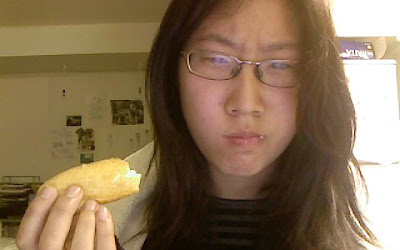Today, more than ever, it's evident that almost everything around is in a state of flux--technological innovations are coming faster than ever, increasingly avant-garde forms of art are being passed around and probably most significant of all, the way we
communicate is transforming: talk,
Tweet, type, text,
Facebook, sign, blog,
Yelp, comment, Skype, IM... the list is almost endless. It's mindboggling.
The medium of communication I'm particularly knowledgeable in is the magazine; I spent more or less
all most of my freshman year at the
University of Michigan laboring under every division of
SHEImagazine, the campus fashion & pop culture publication, culling the knowledge of my classmates and learning how the fashion/media biz works in the
Two Hands. It's been quite educational, in a very underfunded, high-aspiring, time-sucking, nerve-wracking and giddy experience (<-- roundabout plug for recruitment & more funding).
The two issues this year I worked on as part of SHEI. Click on each image to flip through the issue!
I got so involved, I was anointed
Marketing Director after a semester. And when some of my friends decided to expand from a collegiate base to the funky, wonky, awesome world of
Ann Arbor and start up
FORMzine, an online magazine, I decided to tag along and contribute, too.
Being so involved with magazines (to the detriment of the parents, yes), every time I go online or come across a magazine, I'm analyzing and admiring and critiquing. With fashion magazines, especially, there's an evolution that's in progress, which is really, really... cool. (Yes, my thesaurus of a mind decided on "cool").
Let's go take a super-fast, super-short look at the different generations of the modern fashion magazine:
1G} The Print Magazine
Over the last 140 years or so, the fashion magazine has changed quite a while, but
the defining feature is that it is a print magazine by a publishing house, with a staff and editors coming up with and executing ideas to bring a stylized view of fashion to the masses. The most input readers get is their dollar--choosing which magazines to purchase--and the occasional publication of a letter to the editor, but the main point is that the magazine is another
broadcasting* medium: the transmission of a message to a wide audience.
*Broadcasting is generally applied to television and radio, but in my opinion, the basic definition is applicable to print publishing. I believe in the power of print!
2G} The Online Magazine (1.0)
The Net really came of age in the late '90s, with the masses taking to the new medium in the last fifteen years. With basically infinite space available, fashion publications really found their niche in acting as archives and updating with occasional plugs of "Hey, we've got a new issue out; here's what the cover looks like, please subscribe!!"
Obviously, as you can see by the
Teen Vogue screenshot, some sites aren't really subtle at about wanting online visitors to subscribe to the Print Magazine--you've got to close that pop-up before you can start clicking on any of that content-y goodness behind subscription invitation.
The Online Magazine 1.0 is more of a
companion to the Print Magazine, providing coverage that would be too expensive to print, giving previews of content included in the magazine, providing a larger forum for reader commentary, and more recently, the introduction of exclusive content, such as editor blogs or behind-the-scenes videos. What it really, really wants, though is for you to still buy the Print Magazine.
Screenshot of Style.Com. Browse through fashion shows by season, show, year, designer... it goes on.
For about the last ten years, the online magazine has been basically that--
the magazine, put online. Content still run by editors and staff, but much of it much more casual and colloquial in style. And readers can now comment!
3G} The Digital Magazine (Or, The Online Magazine 2.0)
And now, we get to the content that I've been giddy about--the 3G Modern Fashion Magazine! First things first--the 3G MFM is
NOT the downloadable, iPad version of <insert favorite magazine>. As one iPad reviewer said of Interview's app, "The App is basically a PDF file/style of a normal print issue."
The awesome-ness of the Internet has not developed so publishers can basically scan a print magazine and pawn off the PDF to the public as revolutionary and mind-blowing; we have bloggers doing the scanning and distributing the contents for free (and illegally) already.
Recently, though, I came across
FIASCO Magazine. This may be over-excited on my part, but I find founder & editor-in-chief
Vincent Nord's new publication really ushering in the Digital Magazine, or what I like to call the Online Magazine 2.0.
There is no print issue yet, but they're working on it, and in the mean time, the ENTIRE issue (there's only one so far, but it's AWESOME) is available for browsing
and download online. But that's only partly why it's awesome, and not what defines it as the third-generational modern fashion magazine.
Screenshot of the table of contents. So snazzy!
What makes FIASCO the real Digital Magazine is its interaction with the Internet--right on its front page, there's a call for submissions from readers and visitors. Taking a page from the curating nature of many blogs, not everything submitted is selected or published, but there
is content from whom they like to call "young talent" as well as "established creatives." It's up to
readers to provide a large portion of the content, with the editorial staff just sifting through selecting what goes in instead of creating it themselves,
a new dependency and empowerment of the audience.
There are
requirements, of course, so that submissions are at a certain professional-
level of quality and fit a selected theme, but it is no requirement that the submitter him/herself be a professional;
Google many of the names under the credits of FIASCO and you will
not find links to agencies and previously published editorials.
And that's pretty cool.




















































